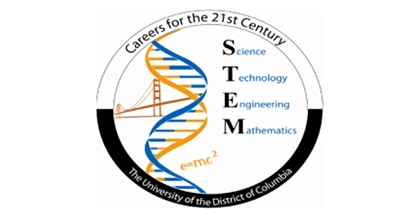
UDC STEM Center Awards 15 Mini-Grants
UDC STEM Center Awards 15 Mini-Grants
Click here to download press release.
The University of the District of Columbia (UDC) Science, Technology, Engineering and Mathematics (STEM) Center for Research and Development awarded 15 Mini-Grants to UDC STEM faculty this spring to begin implementation during the summer 2017 and continuing into the 2017-2018 academic year. Faculty from the following STEM disciplines were awarded Mini-Grants ranging from $5,000 to $7,000: Biology, Chemistry, Civil Engineering, Electrical and Computer Engineering, Civil and Mechanical Engineering, and Psychology. In addition to summer salary, STEM Center faculty receive funds for supplies, publishing costs, and conference travel to present their research results. Each STEM Center faculty Mini-Grant recipient is conducting research with at least one STEM Center undergraduate student. This program is one of many efforts by the STEM Center to increase the number of minority and underrepresented students pursuing careers in STEM disciplines.
The STEM Center is a major vehicle at the University that enhances the research capabilities and productivity of STEM faculty through collaborative professional development activities. These activities are designed to emphasize research as a complement to teaching and an important tool to increase professional productivity of STEM faculty. The enhancement of UDC STEM faculty’s research skills influences their awareness of how to develop an understanding of techniques that lead to consistent improvement in the faculty’s ability to conduct independent research. Additionally, it assists them in adopting best-practices in conducting research, pairs them with experienced researchers in their disciplines, teaches them to adopt effective research methods that improve their techniques, and helps them integrate research into the undergraduate courses and curricula. The Center promotes collegial collaboration among UDC faculty and faculty across the nation through our partnerships with research-intensive institutions (Academic Advancement Partnerships).
In addition to faculty development, the STEM Center is the premier program that initiated the concept of an undergraduate Journal Club on the UDC campus. When it began, it was the only STEM Program included in this forum. In addition to serving undergraduate students on the campus of the University of the District of Columbia, it is a hub for developing unique and innovative ideas and activities for students majoring in STEM disciplines. The Center specializes in facilitating undergraduate laboratory and research experiences for its participants.
This program is funded by NSF Grant HRD 1622811. STEM Faculty Participating in the STEM Center Mini-Grants Awards 2017 include:
Pradeep Behera, Ph.D. – Design and Construction of a Mobile Green Roof System at Van Ness UDC Campus (Civil Engineering)
Kimberly Bell, Ph.D. – Does racial identity moderate the relationships between perceived racism, depressive symptomatology and health behaviors in African-Americans (Psychology)
Benson Cooke, Ed.D. – Practice-Based Evidence Informing the Evidence-Based Practice of Culturally Responsive Generational Treatment of Major Depressive Disorder: Understanding the Role of Epigenomics in Elevating Ubuntu and Developing African-Centered Wellness (Psychology)
Carolyn Cousin, Ph.D. – Genotoxic Effects of Cannabinoids upon DNA of the Snail, Biomphalaria glabrata that has been Exposed to Anandamide (AEA) (Biology)
Hongmei Dang, Ph.D. – Development of a high-efficiency and low-cost core-shell single crystal nanowire FeS2 homojunction solar cells (Electrical and Computer Engineering)
Brandy Huderson, Ph.D. – Ligand-Independent Activation of Nuclear Steroid Hormone Receptors in Two Separate Model Systems (Biology)
Kate Klein, Ph.D. – Development of Novel Nano-machining Capabilities the Helium Ion Beam (Civil and Mechanical Engineering)
Mathilde Knight, Ph.D. – Determination of inducible heat- shock protein 70 (Hsp70) interacting with lectins of Biomphalaria glabrata in relation to productive parasitism in the snail – schistosome relationship (Biology)
Afiya Mbilishaka, Ph.D. – PsychoHairapy and Hair Loss (Psychology)
Esther Ososanya, Ph.D. – Biosensors Applications in medical nanotechnology (Electrical and Computer Engineering)
Rosie Sneed, D.V.M., Ph.D. – Effects of Cannabinoids on the Behavior of Regenerating Planarians (Biology)
Xueging Song, Ph.D. – Evaluation of OTC as Inhibitors of Cysteine Protease (CP) Papain (Chemistry)
Tyagi, Pawan, Ph.D. – Nanomaterial based Electronics and Biomedical Sensors (Civil and Mechanical Engineering)
Lei Wang, Ph.D. – Development of a Novel Geotechnical Design Tool for Geosynthetic Reinforced Soil Structures based on Reliability and Numerical Methods Sensors (Civil and Mechanical Engineering)
Nian Zhang, Ph.D. – Multivariate Chaotic Time Series Prediction Based on a Deep Neural Network (DNN) (Electrical and Computer Engineering)